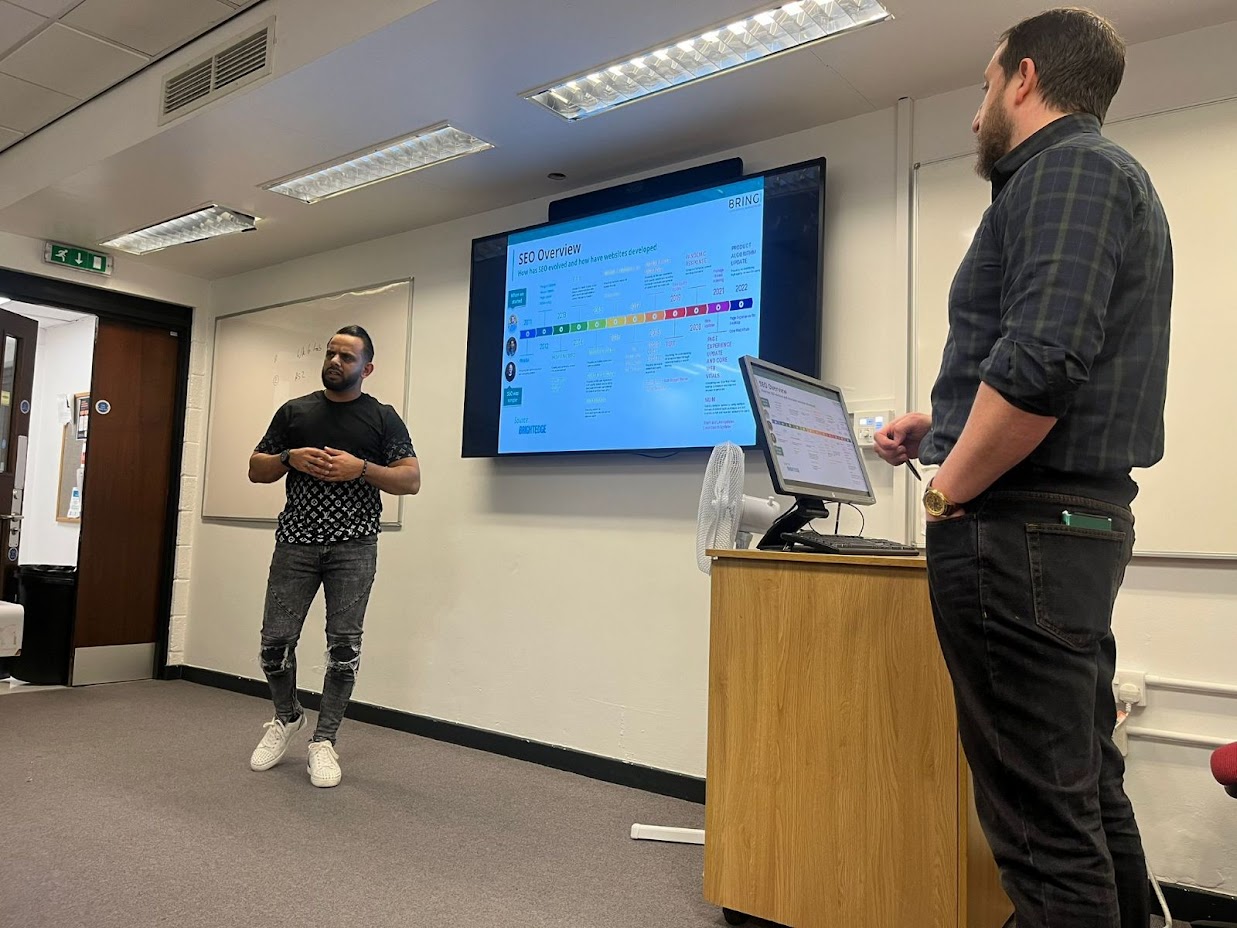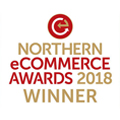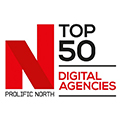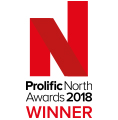
Here at Bring, we’re passionate about supporting new talent and encouraging more people to consider a career in digital. That’s why we partnered with the University of Central Lancashire (UCLan) to deliver a series of industry workshops for Digital Marketing and Communications MSc students.
Justin Young, CEO of Bring Digital, said: “We’re incredibly passionate about helping to develop and nurture digital talent, and our channel experts are excited to work alongside the UCLan team in delivering these sessions. UCLan is known as a leader in digital marketing education, so we’re delighted to join forces to develop and encourage this latest wave of students.”
Emran Bahadur, Associate Director of Technical SEO at Bring Digital, talks us through his experience doing the workshop, his top tips on how to run a successful one, as well as recommending some free tools to get beginner digital marketers or small businesses started with keyword research.
We were asked to show the students at UCLan how a digital marketing agency carries out keyword research. As part of the brief, the university requested that we focus on the methods and tactics students could use to avoid purchasing tools and subscriptions (which can get pricey!).
To make sure we met the brief, we decided to start off by giving the class an overview of SEO and how keyword research fits into devising an organic search strategy. After giving examples of the tools we use, we’d finish off with a practical run-through and give the students an opportunity to ask questions.
Our interactive workshop environment would allow students to learn these approaches first-hand and develop their skill set.
Our first workshop was a great success! We had an excellent turnout, with over 25 attendees participating in the event, which lasted around two and a half hours.
Emran attributes the success to the high level of engagement: “The students were fully engaged throughout the workshop, asking thoughtful questions and contributing their perspectives and experiences to the conversation. We love seeing this, as it shows the students really grasped the material and were eager to apply it.”
“By taking a hands-on approach, the workshop gave students a unique opportunity to apply their newly acquired skills and knowledge in a practical setting. Plus, the tools and techniques we covered are widely used in the digital marketing world, so they’re sure to come in handy in their future careers!”

Interactive workshops are an excellent way for students to learn something new or enhance their existing skills. But what specifically made our keyword research workshop a success? Here are our top tips…
Getting your participants to interact with each other is an essential part of running a workshop; when people feel part of the conversation, they’re more likely to stay interested and remember what they learn.
Plus, when you get everyone talking, you never know what great ideas might come up! One way to do this is to divide the group into teams and create a friendly competition that reinforces the workshop’s main learning objectives.
Emran says: “When leading a workshop, it’s important not to shy away from interaction and to create an open and inclusive environment where participants feel comfortable sharing their perspectives. Doing this will enhance the overall engagement and impact of the workshop, making it a memorable and valuable experience for everyone involved.”
Including time for questions at the end of a workshop gives students a chance to ask any burning questions and clarify anything they’re unsure about.
“Not only did it give students a chance to deepen their understanding of keyword research, but the Q&A session at the end of our presentation also allowed us to see how well the students received the content,” says Emran. “We could then identify any gaps we may have overlooked, ultimately helping us to improve our future workshops and ensure that all attendees got the most out of the session.”
Rather than simply presenting information, a workshop is designed to put theory into practice. By breaking into smaller groups, students can collaborate and work on exercises that reinforce the concepts in the presentation.
“During the workshop, we included planned activities that encouraged students to experiment with various tools, like Google Trends and Ahrefs, using the techniques covered in the session,” explains Emran.
“This created a more interactive learning environment where attendees could apply what they learned in real time. We were there to give feedback and answer any questions, making the whole experience much more engaging. It also helped students better understand and retain the material, enabling them to apply it in their own work.”
Emran explains the value of knowing your target audience when running a workshop: “Before planning our workshop, we spoke with UCLan to find out what students hoped to learn from the session and their current knowledge on keyword research. This ensured we weren’t going over things they already knew or skipping over topics they wanted to learn more about.
We could also customise the workshop to their specific needs, providing relevant and actionable insights so they could get the most out of the experience and leave feeling satisfied with what they learned.”
Emran says: “We left the students with a list of free keyword research tools to help them continue learning and growing even after the workshop had ended. With access to these resources, students can further develop their skills, experiment with new techniques in their own time, and stay up to date with the latest trends in the digital marketing industry. Ultimately this should lead to career success!”
It also helps to build a positive relationship between the workshop instructor and the attendees, as providing free tools demonstrates their commitment to the student’s success and continued growth.
If you’re just starting out in digital marketing, Ahrefs is a fantastic tool to add to your toolkit. It provides various free features that enable you to identify relevant keywords by assessing their search volumes and difficulty to rank on the search engine results page.
Emran says: “Ahrefs is great for analysing your competitor’s search performance and gaining insights into their keyword strategies, top-performing content, and backlink profiles. With this knowledge, you can fine-tune your own content and create a more effective SEO strategy.”
Google Trends is a valuable tool that gives a clear picture of what people are searching for in real time.
“Google Trends is a valuable tool for gaining insights into the popularity of specific keywords and topics over time,” says Emran. “By identifying emerging and seasonal trends and changes in search volume, you can create content during peak periods that align with what people are actively searching for, increasing the likelihood of it being seen and shared.”
When it comes to keyword research, Answer the Public is an excellent free tool that can help you get started. By entering a keyword or topic, you’ll receive a visual representation of the most common queries and questions related to it.
Emran says: “Answer the Public can give a deep understanding of people’s language and phrasing when searching for particular topics. These insights can be used to create more relevant and engaging content you know an audience is searching for.”
“The long-tail keywords generated by Answer the Public are particularly helpful; you can pinpoint less competitive search terms, improving your chances of achieving higher rankings in search results.”
“Plus, it’s free, so it’s super useful when you’re first getting started with keyword research and don’t want to invest in expensive tools!”
Whether you’re a student, a beginner in the industry, or a small business wanting to learn more, check out our list of free digital marketing tools and resources.
So what did we learn from our first workshop?
Emran says: “This workshop taught us a lot about the value of developing and nurturing digital talent, highlighting the importance of collaboration and mentorship. Through our partnership with UCLan, we were able to share our expertise and knowledge with students while also gaining fresh perspectives and insights from the next generation of digital marketers.”
And Dr Conrad Coelho, Business and Marketing Lecturer at UCLan, is also excited about working with Bring and the insight and knowledge it will give to students: “As part of our Beyond Business approach, we ensure our marketing and business students have access and exposure to the very best industry minds, so we’re thrilled to be partnering with Bring Digital.”
“Bring Digital is known as an industry-leading eCommerce agency, working with some of the most exciting global digital brands, and we know our students will take value and insight from these sessions.”
We look forward to continuing our work with UCLan with our next workshop!
From boosting organic traffic to your website with an SEO strategy or growing your business with paid social media advertising, contact us today to find out what we offer.
Or, check out our blog for more expert digital marketing tips and industry insights.











